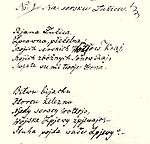Rjana Łužica
|
Handwritten copy of the lyrics. | |
|
anthem of | |
| Also known as |
English: National Anthem of Sorbia English: Our Sorbia |
|---|---|
| Lyrics | Handrij Zejler |
| Music | Korla Awgust Kocor, 1845 |
| Relinquished | 2017 |
Rjana Łužica (Lower Sorbian: Rědna Łužyca; lit. “Beautiful Lusatia”) is the Sorbian national anthem. It was written by poet Handrij Zejler. The lyrics were firstly published on August 24, 1827, in the Leipzig magazine Serbska Nowina. Its music was composed in the beginning of 1845 by Korla Awgust Kocor (German: Karl August Katzer). The anthem was publicly performed for the first time on October 17, 1845, in Budyšin/Bautzen (Upper Sorbian Budyšin, Lower Sorbian: Budyšyn), German Bautzen, formerly Budissin).
Lyrics
| Upper Sorbian | Lower Sorbian | English* |
|---|---|---|
|
|
|
Handrij Zejler’s two additional verses have been excluded from the official version.
| Upper Sorbian | English* |
|---|---|
|
|
References
- English translation by Reinhard F. Hahn (http://lowlands-l.net/anniversary/serbscina-info.php, http://lowlands-l.net/gallery/hahn_rjana-luzica.php)
This article is issued from Wikipedia - version of the Friday, November 20, 2015. The text is available under the Creative Commons Attribution/Share Alike but additional terms may apply for the media files.
